On the back of a detour sign was a brightly painted “Salamat po!” (‘thank you’ in Tagalog) which the hubby noticed as he glanced back at the cloud of dust our speeding cab produced. We found two more similar signs along the under-construction highway, an evident indication of the Filipino workers’ presence on this side of the planet. Nice touch, fellow Pinoys.
This sight tugged back my mind that went briefly wandering in 1999 when pro-Indonesia militias terrorized Liquiçá, a coastal city we were about to approach.
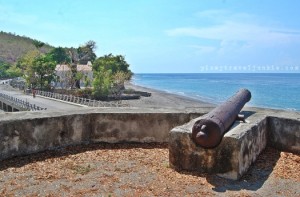
A well preserved cannon in Maubara Fort.
We were somewhere halfway our Dili-Maubara drive. A journey that usually takes a bit over an hour or more when traveling via private vehicle. Abilio, the
local who fetched us in the airport, was our driver and guide for the day. He used to be a cabbie. But since landing a job in Timor Telecom he can only be booked on weekends. He’s a father of twins unfortunately stricken with malaria (hence the effort to make more dibs), originally from
Oecusse District, and a trustworthy soul. Luna adores him.
The westward coastal drive ain’t one of the most scenic we’ve seen in Southeast Asia. Yet the rugged profile of the landscape, the lack of signs of life, the kind of heat that withers all things, and the despondence of it all made it attractive to us.
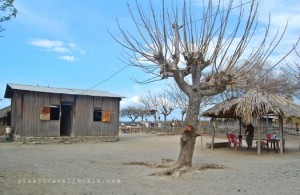 Driving by arid lands.
Driving by arid lands.
We ate dust. Sweat like a pig iron. And developed a hunger for anything edible throughout the journey to our destination. There wasn’t a single convenience store along the highway
. I assumed it’s not feasible to put up one after counting a grand total of… Two other vehicles (both UN’s) that whizzed the opposite direction.
Several kilometers past Liquiçá, I looked at Abilio who was handling dehydration like a boss. “How many more minutes?”, was my embarrassed query.
“It’s very near.”, he nodded towards the front.
I was nearing lightheadedness when our cab finally pulled up.
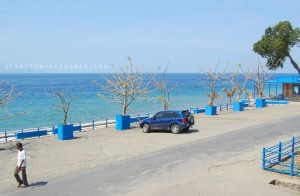 Perched atop the rampart, staring at these blues.
Perched atop the rampart, staring at these blues.
Maubara Fort, a 17th century Dutch fort that was later on handed to the Portuguese in exchange of Flores Island, was not the least bit imposing as I had imagined. It humbly serves as the gateway to Maubara, a village known to be the birthplace of Besi Merah Putih (a militia that’s responsible for the murder of hundreds of East Timorese citizens — most notable of which is the Liquiçá Church Massacre — in 1999).
Unlike Maubara Village’s terrifying tales, Maubara Fort’s stories seem to be hiding between the cracks of the ramparts. There is not much (close to none) details about it that you can fish online. What I did know was there’s a restaurant within the grounds. And that’s where my two wobbly legs led me straight away.
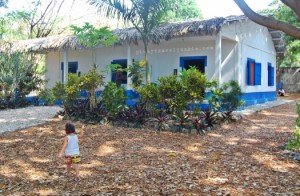 Maubara Fort’s restaurant.
Maubara Fort’s restaurant.
The restaurant’s cramped. Its space could only accommodate five small tables. Because of this, diners who order only beverages prefer to sit in the garden shaded by towering trees. We ordered pancake, fried noodles and chicken and corn with rice. The pancake was quite dry, while the fried noodles reminded us of the un-exciting free brekkie we had for days in a Bali B&B. The chicken and corn with rice may be the best among the three but I never found out cause I ordered it for Abilio.
I’d like to think I ordered the wrong stuff for the resto’s highly recommended by expats. Or I just had a bad batch. Price of meals range from $2-5.
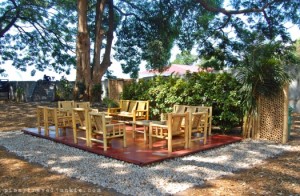 Restaurant’s outdoor sitting area.
Restaurant’s outdoor sitting area.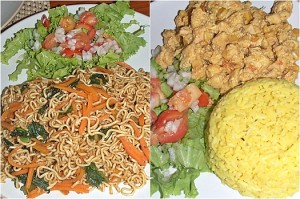 Left: Fried noodles. Right: Chicken and corn with rice.
Left: Fried noodles. Right: Chicken and corn with rice.
After lunch, we briefly semi-circumnavigated the fort and climbed its corner walls to see the brass cannons. View from here’s stellar in its own right. The matching blues of the water, fences and benches pop out of the dry earth’s melancholia. A stark contrast from the fort’s gloomy gray.
We also strolled by the seaside and entered two of the souvenir shops housed in thatched huts. Spent a few minutes watching an old woman weave palm leaves until we decided to buy a couple of her vibrantly hued phone/ciggie cases without haggling. Her weathered face broke into a shy smile.
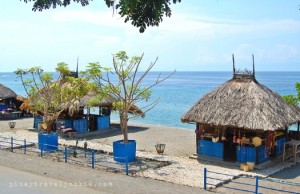 Souvenir shops by the sea.
Souvenir shops by the sea.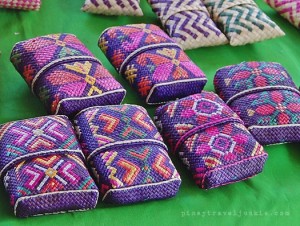 Handwoven palm products that I brought home.
Handwoven palm products that I brought home.
If only we were flying straight home to the Philippines or Australia, I would have bought her baskets and table mats and hanging decor. But we had other, so many other, places to go. Sadly, a few bucks was all we could contribute to a local community who’s slowly recovering from a dark past.
ShareTweet
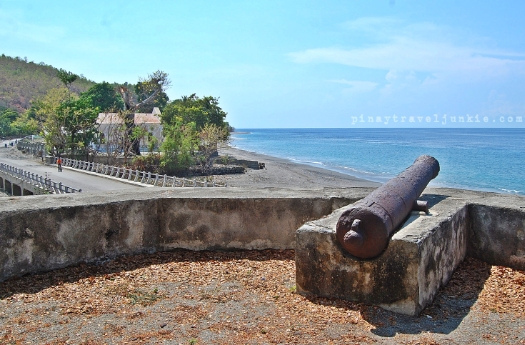









Just curious, thus their language have is creole from Portuguese? Nice hand woven stuff!
They say ‘obrigado’ for thank you! There’s a few who can speak fluent Portuguese, but their official language is Tetum 🙂
whats the easiest way to go to dili. can i go from bali? where to get visa if from phil. what airline
Such an intriguing place. I still have your travel guide here bookmarked. There’s something about rarely trodden places like this. One day.
You can fly from Singapore or Bali. And visa on arrival for Pinoys.
Am sure sure sure you’ll love it too!
Haven’t been there yet but nice to know they have visa on arrival for us!
ayos! visa on arrival. baka mapuntahan ko na ito next year!
Yesss! Journeying James is out to visit all SEA countries! 🙂
Yeah, wag na nila pahirapan tourists. Hahaha. Wala pa naman masyadong options to fly there.
It seems like a pretty silent and almost deserted place to me, although I prefer this kind of solitude. The sea looks wonderfully calm. And without a lot of vehicles, I could only imagine how fresh the air is. I’m starting to love this place now. 🙂
Yes, an ideal place to just sit and let your mind wander 🙂
Oo nga noh! 🙂
Great article! I’ve recently decided to spend 5 months next year travelling around the world. You’re so right about the fact that in most cases we could afford to do such a thing if we make that a priority rather than blowing cash on things that yield no return or substantial impact. I made my decision 2 weeks ago and already “found” $2000 to save toward my trip. Online Travel Agencies